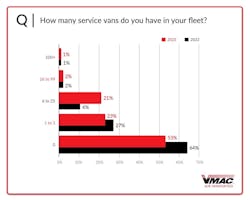Service Vans Gain Traction in Fleets: Survey
Nearly half of all fleets now deploy vans as maintenance and service vehicles, according to the 2023 “State of the Mobile Compressed Air Industry” from VMAC. The report says 47% of respondents have at least service van, up from 36% in 2022. The number of fleets with six to 25 vans increased from 6% in 2022 to 21% this year.
The report acknowledges that the reason for the growth cannot be directly tied to popularity of the vans due to ongoing limits in chassis availability. For construction equipment fleets, Class 4/5 service trucks are more popular than Class 2/3, according to the report. The percentage of all respondents using Class 4/5 trucks as service vehicles grew from 36% to 52% in 2023.
Read also: Kenworth Service Truck Set for Serious Tasks
Of the 133 respondents to the 2023 survey, 62% identified themselves as owners and operators/mechanics. All industries were represented with equipment repair and construction the most prevalent segments at 40% and 39%, respectively.
Fleet age, according to the survey, remains consistent with past years. Vehicles less than 9 years old make up 75% of fleets, compared to 62% in 2022 and 73% in 2021. The average of service vehicles edged up in 2023 with 44% of respondents saying that average age is between six and nine years, compared to 21% in 2022. About one in five (22%) reported average age of three to five years, down from 27% in 2022. According to VMAC, fleet age may be growing due to chassis availability and an increase in used vehicle purchases.
Read also: Alternative Fuels Help Heavy Truck Diesels Dominate
Diesel remains the most popular fuel for service vehicles, although its strength has dimished. In 2023, 51% of respondents said they would be interested in diesel for future purchases, down from 68% in 2022 and 74% in 2021. No other fuel type absorbed that decrease, however, and 20% of respondents said that they have no plans to purchase service vehicles. Hydrogen (12%), electric (11%), hybrid (9%), natural gas (7%), and propane (4%) were other fuel types referenced.
Although 11% of respondents said that they have no concerns about electric vehicles, charging issues were the most common concerns for other respondents. About half (53%) were concerned about range on a charge, 49% were concerned about availability of charging infrastructure, and 36% were concerned about the amount of time required to charge an EV. Acquisition cost being too expensive was a concern for 43% of respondents.
